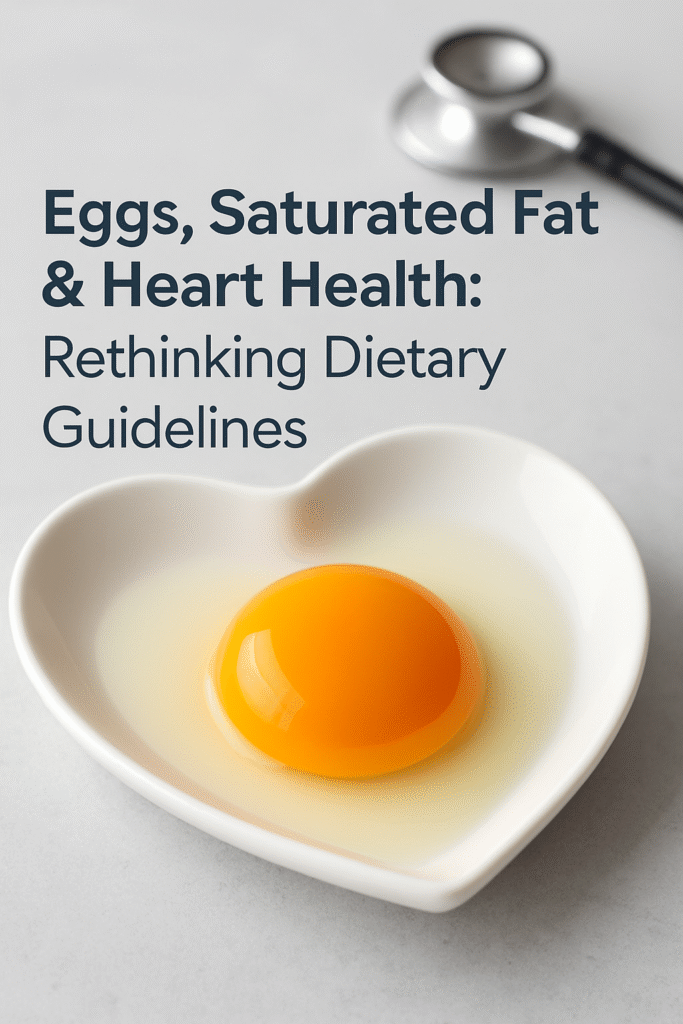For years, eggs have been blamed for raising cholesterol levels and increasing the risk of heart disease. However, new research is shifting the spotlight away from eggs and onto saturated fat as the real culprit behind elevated LDL cholesterol—the “bad” cholesterol linked to cardiovascular disease (CVD) [1].
Why Does This Matter?
Cardiovascular disease remains one of the leading causes of death worldwide. Dietary guidelines have traditionally advised limiting cholesterol intake, especially from foods like eggs, to maintain heart health. But recent evidence suggests that saturated fat may have a far greater impact on LDL cholesterol levels than cholesterol from food sources like eggs [1].
The Study: Eggs vs. Saturated Fat
A recent randomized controlled trial (ClinicalTrials.gov ID: NCT05267522) explored how dietary cholesterol (from eggs) and saturated fat independently affect LDL cholesterol concentrations [2]. The study involved 61 adults (average age 39 years) with moderately healthy cholesterol levels (LDL < 3.5 mmol/L or 135.3 mg/dL). Participants followed three different diets for five weeks each in a cross-over design, meaning everyone tried all three diets at different times:
- EGG Diet: High cholesterol (600 mg/day) but low saturated fat (6% of calories), including 2 eggs per day.
- EGG-FREE Diet: Lower cholesterol (300 mg/day) but higher saturated fat (12% of calories), no eggs.
- Control (CON) Diet: High cholesterol (600 mg/day) and high saturated fat (12%), with only 1 egg per week.
The researchers measured LDL cholesterol levels and LDL particle sizes at the end of each diet phase [2].
Key Findings
- Eggs Lower LDL Cholesterol (When Saturated Fat is Low): Participants following the EGG diet had significantly lower LDL cholesterol levels compared to the Control diet (103.6 mg/dL vs. 109.3 mg/dL, P = 0.02). However, the EGG-FREE diet (despite being low in cholesterol) did not significantly lower LDL compared to the Control (107.7 mg/dL, P = 0.52) [2].
- Saturated Fat Increases LDL, Not Dietary Cholesterol: Saturated fat intake was positively correlated with LDL cholesterol levels (β = 0.35, P = 0.002), while dietary cholesterol had no significant impact (β = −0.006, P = 0.42) [2]. This means the saturated fat in your diet matters more for your LDL levels than the cholesterol content of your food.
- Eggs Affect LDL Particle Size: The EGG diet reduced the number of large LDL particles (β = −48.6, P = 0.03) but increased small LDL particles (β = 95.1, P = 0.004) [2]. Small LDL particles are considered more atherogenic (more likely to promote plaque buildup in arteries) than large LDL particles [3].
- source: https://www.sciencedirect.com/science/article/abs/pii/S0002916525002539#:~:text=Conclusions,more%20atherogenic%20small%20LDL%20particles.
What Does This Mean for Heart Health?
While eating two eggs daily as part of a low-saturated fat diet can lower overall LDL cholesterol levels, the shift towards more small, dense LDL particles could partially offset this benefit. Small LDL particles are more likely to penetrate artery walls and contribute to plaque formation, thus increasing CVD risk [3].
However, the key takeaway is that saturated fat—not dietary cholesterol from eggs—is the main driver of elevated LDL cholesterol levels. Therefore, focusing on reducing saturated fat intake (from sources like fatty meats, butter, and processed foods) may be more important than avoiding eggs.

Why Does This Matter?
Lowering LDL cholesterol is generally considered beneficial for heart health. However, the size of LDL particles matters too. Small, dense LDL particles are more prone to oxidation and arterial plaque formation, making them more atherogenic than large, fluffy LDL particles [3].
While eating 2 eggs daily as part of a low-saturated fat diet can reduce total LDL cholesterol, the associated increase in small LDL particles might partially offset this cardiovascular benefit.
However, it’s important to view this in context:
- Eggs also provide high-quality protein, essential vitamins (B12, D), choline, and antioxidants like lutein and zeaxanthin which are beneficial for eye and brain health.
- The overall dietary pattern (saturated fat intake, fiber, whole grains, fruits, vegetables) plays a far bigger role in heart disease risk than a single food like eggs.
Practical Takeaways
- Eggs Are Not the Enemy: Eating up to 2 eggs per day in a diet low in saturated fat does not raise LDL cholesterol and can fit into a heart-healthy diet.
- Limit Saturated Fat, Not Eggs: Focus on reducing saturated fat intake from processed foods, fatty meats, and high-fat dairy rather than stressing over egg consumption.
- Consider the Whole Diet: Incorporating fiber-rich foods, lean proteins, healthy fats (like olive oil, nuts), and plant-based foods has a stronger effect on improving cholesterol profiles.
- LDL Particle Size Matters, But Not in Isolation: A slight increase in small LDL particles from egg consumption may not be harmful if the overall LDL level and other heart disease risk factors (like inflammation and HDL cholesterol) are in check.
Final Thoughts
This study adds to the growing body of evidence suggesting that saturated fat—not dietary cholesterol from eggs—is the main driver of elevated LDL cholesterol levels and heart disease risk. Eggs, when consumed in moderation and as part of a balanced, low-saturated fat diet, do not pose a significant threat to heart health.
But as always, the quality of your entire diet is more important than focusing on single foods.
The Bottom Line
Eggs, when consumed as part of a low-saturated fat diet, are unlikely to harm your heart health and might even help lower LDL cholesterol. However, keeping saturated fat intake in check is crucial. As always, overall dietary patterns, physical activity, and other lifestyle factors play a significant role in cardiovascular risk


